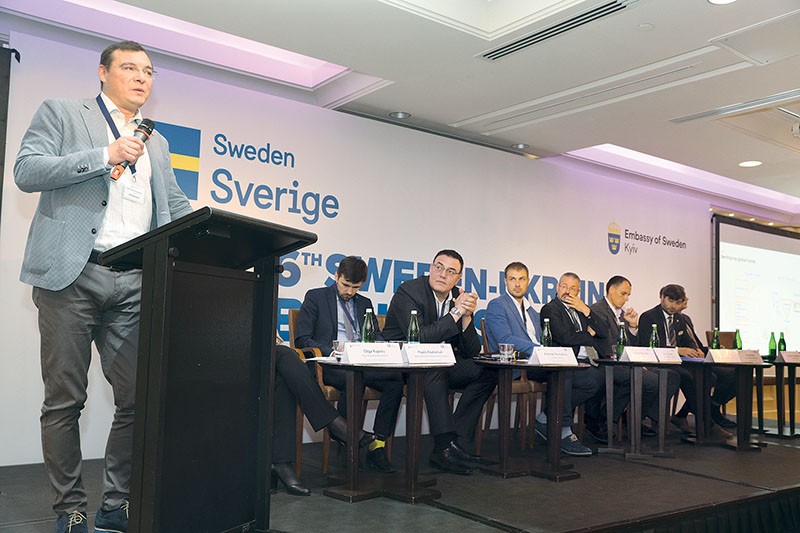In an interview with the Kyiv Post, Swedish Foreign Minister Margot Wallstrom said on June 15 that Ukraine needs to combat corruption and establish rule of law if it wants more business investment from the wealthy Nordic nation.
“There is no trust in the institutions or in the rule of law here,” Walstrom said on the sidelines of the 6th annual Sweden-Ukraine Business Forum on June 15 in the Hyatt Regency hotel. “This what you have to establish fully before you can see an even bigger inflow of investors.”
Wallstrom said Swedish investors and companies tell her they “need reforms. They want to see rule of law. They want to see democracy strengthened. They want to see that there is respect for these provisions. Fighting corruption would be the highest up on their list.”
Ukraine, she said, could imperil recent advancements with the European Union — including a free-trade agrement and visa-free travel — if it doesn’t uphold democratic principles. That is a message she planned to deliver to President Petro Poroshenko and other Ukrainian leaders at meetings later in the day.
“They have to fulfill those commitments,” Wallstrom said. “We will remind them there is a suspension clause. If we see that reforms do not take shape as planned or as promised, we can suspend (visa-free travel).” Ukrainians on June 11 won the privilege to travel up to 90 days throughout most of Europe without needing visas.
Sweden has much bigger influence on Ukraine than most nations.
Even though it has only 10 million people, Sweden is one of the world’s richest and most generous nations — pledging 1 percent of annual economic output to foreign aid.
For Ukraine, this commitment has translated into annual, multi-year assistance ranging from $22 million to $28 million. The aid is largely carried out through the Swedish International Development Cooperation Agency to support democracy, energy efficiency, human rights, independent journalism, civil society and many other initiatives.
“That’s why we keep coming back,” said Wallstrom, whose visit on June 15 marked her fourth trip to the nation. “We keep being very, very active. We join forces with other member states and partners. We keep the pressure up. We are meeting with the president today. We are meeting with civil society. We insist on keeping control over what we do ourselves and with our investments here…We have to insist on reforms.”
Russian threat
Wallstrom also addressed the greater security threat posed by Russia. Like Ukraine, Sweden is not part of the 29-nation NATO military alliance. Unlike Ukraine, perhaps, Sweden doesn’t want to be part of NATO.
Russian President Vladimir Putin has also threatened Sweden to stay out of NATO.
While denying that Russia would ever invade Sweden, unlike Ukraine, Putin said in an interivew earlier this month that the Kremlin “will interpret” Swedish entry into NATO “as an additional threat for Russia and we will think about how to eliminate it. If Sweden joins NATO, this will affect our relations in a negative way because we will consider that the infrastructure of the military bloc now approaches us from the Swedish side.”
Wallstrom said that, while Sweden will not be intimidated by any threats, Sweden has no intention of joining NATO.
“Nobody threatens us. Nobody should threaten us. We make our own decisions independently. We remain firm and we remain consistent,” Wallstrom said.
“We have been military nonaligned for 200 years. It has served us well and continues to serve us well. We will do what it takes to make sure our country is safe and our territorial integrity is respected…We think this is not the time to change our basic security policy. Absolutely not.”
She said that Sweden is strengthening its own defenses. The nation has recently reintroduced military conscription. The foreign minister also said Sweden is cooperating more extensively militarily with other nations, particularly neighboring Finland, but also the United Kingdom, Germany and the entire NATO alliance.
“Security these days is more than a pure direct military threat, she said. “We also have to invest in peace and in preventing conflict.”

Businesspeople at the 6th annual Sweden-Ukraine Forum discuss bilateral trade and investment ties on June 15 in the Hyatt Regency Hotel in Kyiv. (Volodymyr Petrov)
More sanctions?
As for pressuring Russia to end its war against Ukraine, in its fourth year, and return the Crimean peninsula, Wallstrom said that Sweden would be open to tougher economic sanctions against the Kremlin. But she doesn’t believe that is politically realistic within the E.U.
“We know that it has been an effort to keep the sanctions that we have,” Wallstrom said. “We would definitely be willing to discuss tougher sanctions, but that is not realistic today to introduce tougher sanctions. Now we have to insist on the realization of Minsk agreement, also not to accept that this slips off the agenda of the European Union or the international community. So I think that’s most important now and to keep pressure on Russia.”
The 2015 Minsk peace agreement calls for Russia to impose a cease-fire in Ukraine, withdraw its support and troops from eastern Donbas, return control of the 400 kilometers of eastern border to Ukraine and allow international monitors unfettered access. Russia has not lived up to any of those agreements. The war has claimed more than 10,000 lives and displaced more than 1.5 million people.
